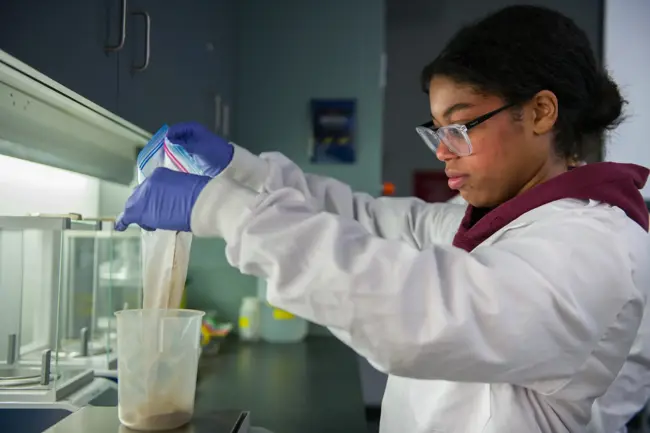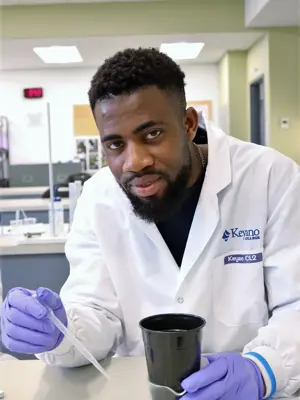Yes. The program can be completed part-time over an extended period.
Environmental Technology Co-op Diploma
The Environmental Technology Co-op Diploma Program at Keyano College is a two-year, nationally recognized program designed to prepare students for work in environmental science and resource management. With Alberta’s oil sands, mining, and forestry sectors in focus, students explore the natural world and how to manage it sustainably.
This program combines hands-on lab training, fieldwork, and a summer co-operative work term, allowing students to apply their learning directly to environmental monitoring, reclamation, and conservation projects.
Graduates are prepared for immediate employment or may choose to transfer to the third year of the Environmental Science degree program at the University of Lethbridge.
What You’ll Learn
You will develop practical and scientific skills across the following areas:
- Environmental sampling, testing, and data analysis
- Plant and animal identification
- Water and soil quality monitoring
- Ecosystem management and land-use planning
- Environmental legislation and compliance
- GIS and geotechnical field techniques

Learning Outcomes (Post-Grad)
Graduates of this diploma program will be able to:
✔️ Collect and analyze environmental data in both lab and field conditions
✔️ Monitor water, soil, and biodiversity health
✔️ Identify local flora and fauna with ecological precision
✔️ Apply GIS, GPS, and remote sensing technology
✔️ Understand and comply with environmental law and land use policies
Communicate effectively in technical and academic settings

Career Opportunities & Pathways
- Career Options
- This diploma prepares you for a range of careers, including:
- Environmental Technician
- Conservation and Reclamation Assistant
- Water Quality Monitor
- Wildlife or Fisheries Technician
- Field Technologist
Further Education Pathways
Graduates may also choose to:
- Transfer into year three of the BSc in Environmental Science at the University of Lethbridge
- Pursue Environmental Science Micro-Credentials at Keyano
- Enter university studies in ecology, environmental engineering, or natural resources
Program Structure
Fall Intake
Year 1
Term 1
-
BIOL 108 – Introduction to Biodiversity
-
CHEM 101 – Introductory University Chemistry I
-
EAS 100 – Planet Earth
-
ENVT 170 – Animal Identification
-
WRITE 103 – Scientific Writing
Year 1
Term 2
-
ENVT 163 – Water Quality
-
ENVT 165 – Geotechnical Sampling & Instrumentation
-
ENVT 268 – Resource Exploitation – Oil, Gas, Bitumen & Mining
-
GEOG 105 – Mapping, GPS, Remote Sensing, and GIS
-
STAT 151 – Introduction to Applied Statistics I
Year 1
Term 3
-
ENVT 220 – Co-op Work Term
Year 2
Term 1
-
BIOL 208 – Principles of Ecology
-
CHEM 261 – Organic Chemistry
-
ENVT 252 – Regional Plant Identification
-
SOILS 210 – Introduction to Soil Science
-
SPCH 207 – Developing Professional Speaking Skills
Year 2
Term 2
-
EAS 208 – Introduction to Global Change
-
ENVT 262 – Environmental Laws & Land Rights
-
ENVT 265 – Forest Technology
-
ENVT 266 – Land Reclamation
-
ENVT 270 – Wildlife Management and Conservation
Program Structure
Winter Intake
Year 1
Term 1
-
BIOL 108 – Introduction to Biodiversity
-
CHEM 101 – Introductory University Chemistry I
-
GEOG 105 – Mapping, GPS, Remote Sensing, and GIS
-
STAT 151 – Introduction to Applied Statistics I
-
WRITE 103 – Scientific Writing
Year 1
Term 2
-
BIOL 208 – Principles of Ecology
-
EAS 100 – Planet Earth
-
ENVT 170 – Animal Identification
-
ENVT 252 – Regional Plant Identification
-
SOILS 210 – Introduction to Soil Science
Year 2
Term 1
-
ENVT 265 – Forest Technology
-
ENVT 266 – Land Reclamation
-
ENVT 268 – Resource Exploitation – Oil, Gas, Bitumen & Mining
-
ENVT 270 – Wildlife Management and Conservation
Year 2
Term 2
-
ENVT 220 – Co-op Work Term
Year 2
Term 3
-
ENVT 163 – Water Quality
-
ENVT 165 – Geotechnical Sampling & Instrumentation
-
ENVT 262 – Environmental Laws & Land Rights
-
SPCH 207 – Developing Professional Speaking Skills
Admission Requirements
High School Admission
Applicants must hold an Alberta High School Diploma (or equivalent) and must have successfully completed:
- English 30-1
- Math 30-1
- Chemistry 30
- Biology 30
Mature Student Admission
Applicants must be at least 21 years old or out of school for three consecutive years. You may:
- Present the same high school course requirements above, OR
- Complete a College Entrance Assessment if you're missing required courses.
Contact an academic advisor to explore your options.
English Language Proficiency
If English is not your first language, you must meet one of the following minimum test scores:
- TOEFL iBT: 79 (no section below 19)
- IELTS: 6.0
- CAEL: 60
- MELAB: 80
- Duolingo: 95
- PTE Academic: 50
See the Credit Calendar for additional options.
Tuition and Fees
Duration: 2 years
Eligible for Domestic and International Students
| Tuition & Fees (2025–26) | ||
| Term | Domestic Students | International Students |
| Fall | $2,724.00 | $7,212.00 |
| Winter | $2,724.00 | $7,212.00 |
| Total | $5,448.00 | $14,424.00 |
Please note
- These estimates are based on 100% enrolment for all semesters and do not include mandatory laboratory fees. Laboratory fees can range from $35-$135 for 2025-2026.
- *Students will be charged a medical/dental benefit fee unless they opt out by demonstrating alternative coverage - deadlines can be found at StudentCare website.
** Tuition is due 10 business days before the start of each semester.
For more information view the Keyano College Credit Calendar.
Refunds, Withdrawals, and Deposits
For information about withdrawals, tuition refunds, program cancellations, and deposit policies, please refer to the Refund Policy page.
Frequently Asked Questions
Is this program open to international students?
Yes. International applicants are welcome. Please refer to the international tuition schedule.
Yes. Many courses include mandatory field trips and outdoor lab work within the Fort McMurray, Alberta region.
Does the co-op term require relocation?
In most cases, co-op placements are local or regional, but students may choose opportunities elsewhere.
Join the Next Generation of Environmental Leaders
Apply today or contact admissions for more information
